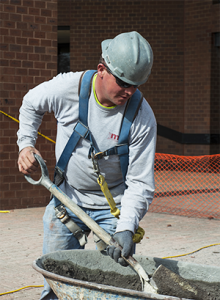As construction continues around campus, Rex Hays explains its importance
By Tucker Swiastyn

It might be hard to ignore the orange fences and construction signs around the college. The blunt sounds of machinery cutting through bricks and loud beeps fill the classroom walls. To students, construction around campus might be nothing more than loud noises and disruption, but men and women are continually working hard to keep the college campus in its prime.
The most recent work being done are masonry repairs. These repairs are intended to replace cracked bricks and cracked mortar.
Much like doing an inspection on a house, an inspection is done on the college buildings to assess what work needs to be done. This inspection is known as a building envelope.
“We have a plan in place,” said Rex Hays, assistant vice president of Campus Services. “We get a budget and we work towards that budget to make as many repairs as we can.”
The CSB, GEB and the COM buildings were all part of the now finished masonry project. The next buildings to get masonry repairs will be the north side of the science building, CLB and OCB.
Based on the repairs needed — masonry, caulking, mortar and angle modifications on the bricks — the cost on the next three buildings will be $247,000. This kind of work on bricks is vital because the structure’s integrity can be compromised by water damage.
“The most important thing about maintaining a facility is really all about keeping the water out,” Hays said. “You definitely don’t want water running into a building, because then you can run into mold issues, and that’s really costly to mediate.”
One of the biggest challenges in the construction around campus is the complaints from students and professors. Cutting bricks is not a quiet procedure, but it has to be done. However, Hays goes to great measures to make the students and teachers as comfortable as possible.
“I try to determine what the scope of work is,” Hays said. “Then I try to find out the schedules those particular classrooms run at. I will coordinate with the class scheduler and ask to relocate classes if there is a lot of noise. I’ll have the workers do work outside of those hours that those classes are occupied.”
Whether it’s raining or snowing, night or day, men and women are at work every day to maintain this nationally renowned college in Johnson County.






















